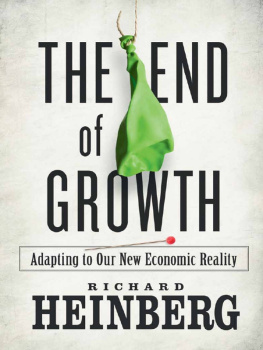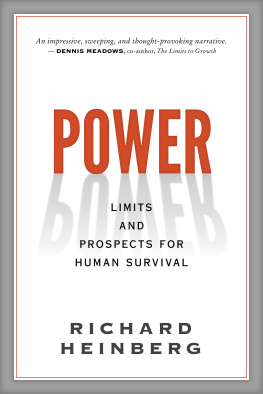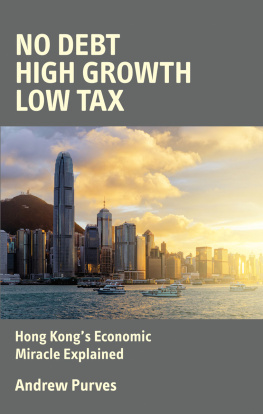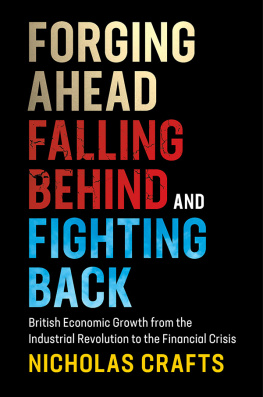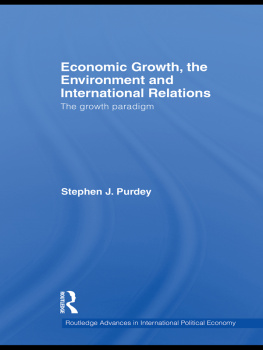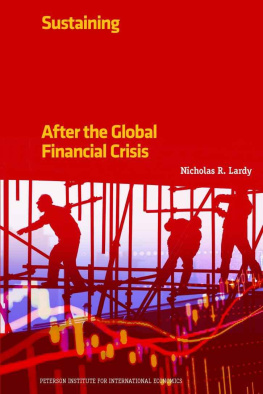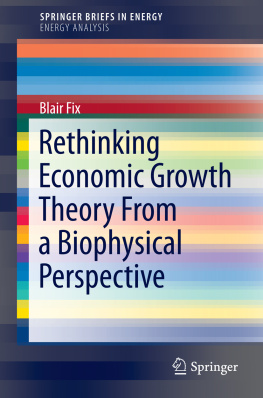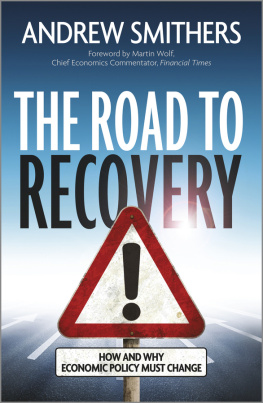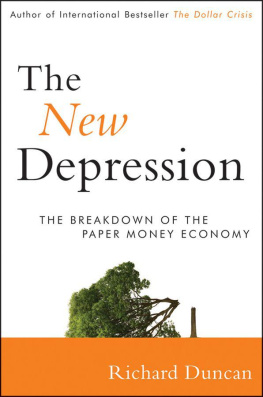Contents
This book has benefited from the contributions of many people whose help deserves recognition.
I will start with the staff of Post Carbon Institute, the organization for which I am happy and proud to work. Asher Miller, Daniel Lerch, Ken White, and Tod Brilliant read the manuscript in various stages and offered key editorial suggestions. This team has also collaborated with me on related projects including short YouTube videos such as the award-winning300 Years of Fossil Fuels in 300 Seconds and Who Killed Growth? Crystal Santorineos transcribed interviews and Simone Osborne published excerpts from the book on PostCarbon.org and EnergyBulletin.net (readers of those excerpts in turn sent in valuable suggestions for the manuscript).
New Society Publishers also deserve thanks especially Ingrid Witvoet, who edited the manuscript; Chris and Judith Plant, who responded enthusiastically to The End of Growth when it was no more than an idea; Sue Custance who helped shepherd the project along; and E. J. Hurst, who masterminded promotional efforts.
Jared Finnegan put his recent studies at the London School of Economics to use in offering informed editorial suggestions for the manuscript, and also in preparing the graphs and their captions a task that involved gathering dozens of data sets from a variety of sources. Jareds editorial input was especially crucial to the section The End of Development in Chapter 5.
Suzanne Doyle contributed many hours to compiling the Notes, finding sources and keeping track of hundreds of references.
My research for The End of Growth entailed interviews and conversations with many brilliant thinkers, each of whom deserves an introduction as well as my great thanks.
A conversation with Gus Speth one of the giants of the environmental movement, who taught for many years at Yale (and now at Vermont Law School), and author of A Bridge at the Edge of the World: Capitalism, theEnvironment, and Crossing from Crisis to Sustainability brought me up to speed with recent developments in the world of alternative economics. Another conversation, this one with John Fullerton, formerly Managing Director of JPMorgan and more recently the founder of the Capital Institute, helped me understand the culture of Wall Street and how it evolved during the past quarter century. These days John is working on steering the investment world toward a just, sustainable, and resilient economy and is pioneering several promising efforts in that direction.
Herman Daly, pioneer ecological economist, former World Bank economist, and author of The Growth Illusion, generously agreed to read and comment on Chapter 6.
Nate Hagens, hedge fund manager-turned-ecological economist, read most of the manuscript and contributed many important suggestions; his expert knowledge of the workings of financial markets informed Chapter 2.
Josh Farley, Fellow of the Gund Institute for Ecological Economics and a Professor in the Community Development and Applied Economics faculty at the University of Vermont (and co-author with Herman Daly of the textbook Ecological Economics), read most of the manuscript and provided crucial guidance in several areas. A few of the explanatory Notes are lifted nearly verbatim from his comments in the margins of the manuscript. Hazel Henderson, futurist and author of Ethical Markets: Growing theGreen Economy, has been critiquing conventional economic theory for decades while offering alternative ways of making money work for people (rather than the other way around). Interviewing her helped open my thinking to possibilities I hadnt considered, and I tried to capture these in Chapters 6 and 7.
Chris Martenson, creator of The Crash Course and veteran of ten years in corporate finance and strategic consulting, writes an ongoing series of commentaries about the world financial situation. Because Chriss worldview is shaped by his awareness of resource limits and by systems thinking, I find his analysis particularly credible and useful. His insights are reflected in Chapter 2 and 3.
Nicole Foss is co-editor of TheAutomaticEarth.com, where she writes under the name Stoneleigh; she also runs the Agri-Energy Producers Association of Ontario, Canada, where she focuses on farm-based bio-gas projects and grid connections for renewable energy. While living in the UK, Nicole was a Research Fellow at the Oxford Institute for Energy Studies, where she specialized in nuclear safety in Eastern Europe and the former Soviet Union. Ive benefited from reading many of her commentaries on the world financial scene, and Chapter 2 incorporates a number of important insights she conveyed during a long conversation in December 2010.
Charles Hall, Professor of Systems Ecology at State University of New York College of Environmental Science and Forestry in Syracuse, is the worlds principal authority on the subject of net energy, discussed in Chapter 4.While I owe a general, long-standing debt to Charlies research (whose importance is still unrecognized by many energy analysts), his most recent peer-reviewed publications provide crucial support to some of the core arguments in this book.
David Murphy, one of Charlie Halls former students and now an important researcher in his own right, is the author and co-author of key peer-reviewed papers on net energy cited in Chapter 4. David read that chapter and made important suggestions.
Michael Klare, Professor of Peace Studies at Hampshire College and author of Rising Powers, Shrinking Planet, is the worlds foremost authority on linkages between resource depletion and geopolitics. A conversation with him in late 2010 was the basis for the section Post-Growth Geopolitics in Chapter 5.
Bill Ryerson, founder and President of Population Media Center and President of the Population Institute, is the wisest, best informed, and most effective advocate for population issues I know. Our conversation laid the groundwork for the section Population Stress: Old vs. Young on a Full Planet in Chapter 5.
Mats Larsson, a management consultant and author of several books including The Limits of Business Development and Economic Growth, was an important source for Chapter 4, which he also read and commented on.
Jason Bradford, a former research biologist at Washington University and Missouri Botanical Garden, who currently leads the farmland management program for Farmland LP, read and commented upon much of the manuscript and drafted a sidebar for Chapter 7.
Warren Karlenzig, one of the worlds top experts on urban sustainability strategy and metrics, and author of How Green is Your City? TheSustainLane U.S. City Rankings, is a frequent traveler to China, where he consults with local authorities on planning issues. His insight into that nations predicament and prospects is reflected in the section The China Bubble in Chapter 5.
David Fridley, staff scientist at the Energy Analysis Program at Lawrence Berkeley National Laboratory and expert on Chinas energy policy, also offered important input to The China Bubble.
Doug Tompkins, who enjoyed notable success in business and went on to become one of the worlds leading conservationists, read the manuscript and made helpful suggestions, while the Foundation for Deep Ecology provided material assistance for the promotion of this book.
Helena Norberg-Hodge, founder of the International Society for Ecology and Culture, has been a friend and inspiration for many years; her perspective is explicit in the section The End of Development in Chapter 5, but also subtly flavors Chapters 1 and 6.
These expert readers and sources kept me from making many mistakes that would otherwise have compromised the core message of The End ofGrowth. Any errors that remain are my sole responsibility.
Next page
